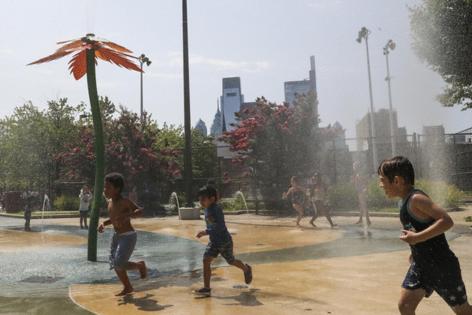Philly about to bake in a potentially dangerous first heat wave of the season
Published in News & Features
PHILADELPHIA — The temperature made it to 91 on Saturday in Philly, and by the end of the workweek, that kind of heat may seem like a cool shower.
By then, said Zack Taylor, chief of the analysis section at the National Oceanic and Atmospheric Administration’s Weather Prediction Center, heavily populated areas in the Midwest and East may have experienced historic levels of heat.
“You’re looking at numerous daily high records,” he said, “high temperatures and” — perhaps more ominously — “morning lows.”
Heat indexes could reach 108, the National Weather Service says, and overnight lows might not get below 80 on Monday, Tuesday, and Wednesday mornings.
The weather service has issued an “extreme heat warning” for Sunday through Wednesday, and Philadelphia has declared a “heat emergency.”
In addition, the Pennsylvania Department of Environmental Protection has posted a “code orange” air-quality alert for Sunday, advising people with respiratory and heart conditions to limit time outdoors.
It was unclear when the heat wave would break, but “it’s not just one and done,” Taylor said.
NOAA’s HeatRisk forecast has the dangerous “magenta” zone spilling from the upper Midwest into the Mid-Atlantic from Sunday through Tuesday.
On the 1-to-4 scale, magenta is a level 4, reserved for “extreme heat with little to no overnight relief.”
Plus, given the potential duration and how generally temperate it has been for the last several weeks, this might have far different effects from those of a similar stretch later in the summer.
“There’s just no comparison,” said Laurence Kalkstein, a climatologist who is a heat-mortality expert. “People are unacclimatized, and they are much more likely to get sick or die.”
Kalkstein helped Philadelphia develop a pioneering heat-response system in the 1990s.
And, yes, Mayor Cherelle L. Parker says the city is fully prepared for this one.
Will Philly ends its 100-degree drought?
It has been 13 years since the official temperature reached 100 in Philly — the longest 100-less run in over a century — but that may happen both Monday and Tuesday.
Conditions look to be especially ripe for rising temperatures, with minimal cloud cover and drying winds, said Alex Staarrmann of the National Weather Service in Mount Holly.
The atmosphere will be thick with water vapor, Taylor said, in part due to recent rains that have moistened the foliage throughout the region.
But don’t expect showers to wring out any of the moisture, or even much in the way of cloud shadows.
“It looks like it’s going to be solidly full sunshine,” he said.
High pressure, or heavier air that discourages rainfall, has much of the eastern half of the nation under glass.
Why would this one be so dangerous?
Temperatures since May 1 have come close to seasonal normals, and “a lot of folks are still in May mode,” said Dave Dombek, senior meteorologist with AccuWeather Inc.
“It’s going to be a shock to the system.”
The daytime highs Monday and Tuesday could set records for the dates, but of particular concern would be the lack of cooling at night.
That primes houses, particularly rowhouses where so many of the heat-vulnerable live, to warm rapidly after the sun rises.
“Those rowhouses literally become brick ovens,” said Lawrence Robinson, a former city health department official who was an architect of that 1990s heat-response system, which was lauded by NOAA and the Centers for Disease Control and Prevention as a national model.
How Philadelphia is preparing
Philadelphia will open more than 40 cooling centers throughout the city and remind people to look in on elderly neighbors and acquaintances.
The Philadelphia Corporation for Aging’s Heatline, 215-765-9040, will be operating from noon to 8:30 p.m. Sunday and 8:30 a.m. to 8:30 p.m. Monday, Tuesday, and Wednesday.
The line will stay in operation if the heat continues.
Although average summer temperatures have been warmer in recent years, the city’s heat-wave death tolls have declined dramatically.
In the 10-year period that ended in 2002, 400 heat-related deaths occurred. In the summers since 2013, fewer than 50 have been reported.
Any chance that this heat won’t be so bad?
The atmosphere’s behavior has been known to elude Earth’s mightiest computers.
It’s possible the heat could shut off earlier than expected.
AccuWeather’s Dombek said it’s remotely possible that “ring of fire” cooling thunderstorms develop in the perimeter of the heat dome.
However, if that were to happen, the likely targets would be well north of Philly, he added.
No forecast is a sure thing. But forecasters have been saying for days that this one is pretty close.
Said Taylor: “It’s going to be a fairly extended period of higher heat.”
©2025 The Philadelphia Inquirer. Visit inquirer.com. Distributed by Tribune Content Agency, LLC.







Comments